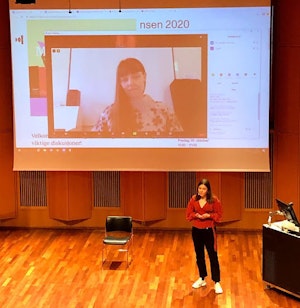Around 30 audience members had found their way through the warren of hand sanitisers to the Levin Hall at the Norwegian Academy of Music (NMH) on Friday 30 October. Keeping the required distance between audience members, every numbered seat was filled when project managers for the Music Student Conference 2020, Anna Rødevand and Siri Storheim, stepped up to welcome both physical and digital participants.
– Just over a year ago we both completed our bachelor degree here at the academy. And we felt a bit lost. We had made slightly traditional choices without quite knowing why. Music education, and perhaps classical music education in particular, takes a one-sided view of what constitutes success, the two NMH students began, before introducing the first speaker of the day.
Camilla Overgaard appears on a screen on the wall live from Aarhus, Denmark where she recently graduated from the Royal Academy of Music as both a classical and rhythm guitarist. Or as a musician, a label she tries to use instead. This way, she avoids being pigeonholed in ways she does not recognise.
– I mix techniques from classical and rhythm guitar, so I’m a kind of hybrid, you might say. This also meant that I didn’t feel entirely at home at the academy, Overgaard explains.
The key to success
It was this sense of otherness that led her to begin investigating how society defines success by way of stereotypes. Success is often associated with hard work and an uncompromising attitude, a desire to sacrifice everything.
Do an image search of the word success in Google, and you will find people climbing upwards, conquering stairs and assuming a power pose atop mountains.
Higher music education also espouses specific notions of what a successful musician is and does, according to Overgaard. They win competitions, release albums, receive awards and gain media attention. But could working on an intriguing pedagogical question be just as successful?





